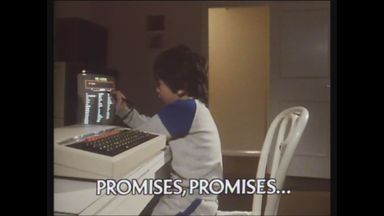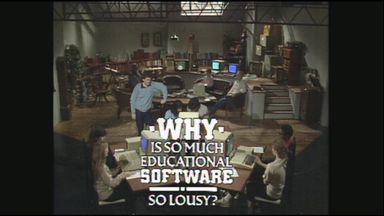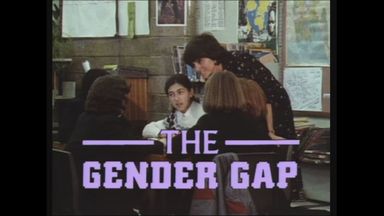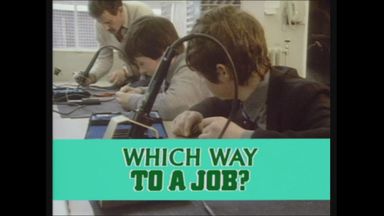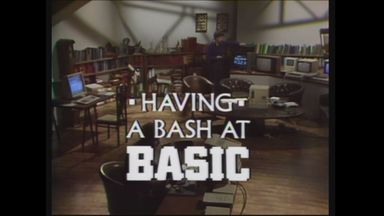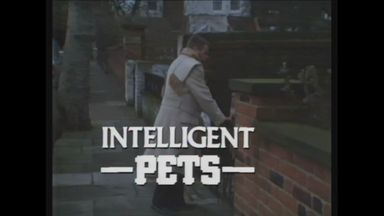The Learning Machine
1. Promises, Promises
Clips from this programme
Intro: Kenneth Baker (1984) Kids must be trained with the skills of tomorrow, computers in schools
Duration: 01:14The New Technology World - Jobs transformed and changed children's interactions with computers: e.g. Braille and text to speech machines, new roles for teachers
Duration: 02:54Computers will change the teacher/pupil relationship - Will teachers be replaced altogether and schools be unneeded? Learning what!?
Duration: 03:28Computers first arrival in Primary schools (Dan Gandolfo - Courtwood Primary School) - Children teaching the staff, Example Programs (Into the unknown) - Effects on the learning process, (Heather Govier - Microelectronics Education Programme (MEP))
Duration: 05:59Computers for maths & science (girls overlooked)
Duration: 01:15Commercial Software use: Word processing for School Magazine - Handwriting skills threatened (Graham Sullivan)
Duration: 01:12Tim O'Shea: A Micro in every School - who has benefited? Liberating the computer from the Computer studies department (Croydon) - Information Technology / Information handling for all subjects
Duration: 04:32Teacher Training in I.T. and the computer keyboard will place girls in the secondary role as the typewriter did - Positive discrimination
Duration: 02:05Teachers - Which computer to buy and correct software for Schools and Parents
Duration: 01:24Poor software, 'Making The Least of The Micro', disillusion - Tim O'Shea
Duration: 01:17The Learning Machine
1. Promises, Promises
First broadcast: 25th April 1985
Duration 24:49
A personal view by Tim O'Shea of computers in education. The first of six programmes Promises, Promises ... As teachers have pointed out: 'They gave us the machines before anyone knew what to do with them.' Tim O'Shea questions the motives for putting micros into schools and suggests what is needed for the computer to live up to its educational promise. Film editor HOWARD SHARP Producer IAN WOOLF
Now playing
2. Why is so much educational software so lousy?
First broadcast: 2nd May 1985
Duration 24:28
A personal view by Tim O'Shea of computers in education. 2: Why is so much educational software so lousy? Why it is so difficult for parents and teachers to find educational software that does something useful, or at the very least does what it's supposed to do? Studio director: ROBERT ALBURY Producer: IAN WOOLF
3. The Gender Gap
First broadcast: 9th May 1985
Duration 24:46
A personal view by Celia Hoyles of computers in education. 3: The Gender Gap. Girls are often excluded from computers at home and in school. They're even told that they shouldn't be interested in technology! Celia Hoyles , Professor of Mathematics, Institute of Education (London University), explores the myths and prejudices about computing and girls. Series producer IAN WOOLF Producer ROBERT ALBURY
4. Which Way to a Job?
First broadcast: 16th May 1985
Duration 24:32
A personal view by Tim O'Shea of computers in education. A series of six programmes 4: Which Way to a Job? 'If we don't prepare pupils for a technological future we're sunk!' Is the technical and vocational teaching now appearing in our schools the best preparation for the changing world of work? Film editor JANE WOOD Producer LAN WOOLF
5. Having a Bash at BASIC
First broadcast: 23rd May 1985
Duration 25:00
A personal view by Tim O'Shea of computers in education. A series of six programmes 5: Having a Bash at BASIC. 'BASIC? - The worst thing since sliced bread!' With a variety of professional programmers, Tim O'Shea presents the case against BASIC, and looks at recent developments in programming languages. education. Studio director ROBERT ALBURY Producer IAN WOOLF
6. Intelligent Pets
First broadcast: 30th May 1985
Duration 24:21
A personal view by Tim O'Shea of computers in education. The last of six programmes 6: Intelligent Pets. Tim O'Shea looks at some possible futures for computers in education with Professor Aaron Sloman and Dr Benedict du Boulay Alison Kidd and Alex d'Agapeyeff. Sketches written by PAUL HINES Producer IAN WOOLF Director ROBERT ALBURY












